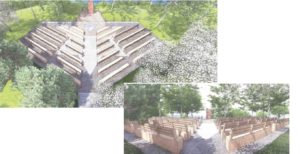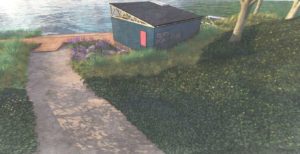In 1965, a Boy Scout camp on a narrow peninsula on the North Arm of Lake Minnetonka was purchased by Temple Israel to give Camp TEKO a home that wasn’t at Temple or Lake Nokomis, where it had split the summer days since Rabbi Albert Minda founded the camp in 1945.
But in 56 years since moving to Orono, it hasn’t been the focus of significant fundraising efforts. That is changing, as Temple Israel announced The Campaign For Camp TEKO, a $12 million campaign that quietly started in 2019, and is nearly two-thirds complete prior to going public. Of the funds raised, $10 million is going towards capital projects and $2 million for an endowment for permanent funding for scholarships as well as future maintenance.
“There was a community campaign that gave TEKO a million dollars and the early 2000s, but before that, and after that we really have not had any major campaign for this project for this piece of land for the camp,” said Rabbi Marcia Zimmerman. “In 2010 and again in 2016, we had strategic plans that said use TEKO more. So in that strategy and vision, this project was born that in order to use it more there, we need to, we need to renovate because there have been a couple of cabins and structures that have been condemned by the city because they weren’t safe anymore.
“So this project is one that brings us to this moment using TEKO more from a very strategic and sustainable lens.”
Sustainable is a key word in the upcoming project. Zimmerman said that new buildings will have no carbon footprint.
“The goal and to teach the Jewish value of taking care of and being good stewards of our Earth,” she said. A carbon-neutral TEKO also fits into the Temple Israel strategic plan of being carbon neutral by 2030.
“It’s something that the board has now taken up as a major initiative, and TEKO has become kind of the cornerstone of that initiative, even though we’re making it so that our Emerson campus is sustainable and LEED certified.”
The new driveway area for the buses and security office will have solar panels on the roof, as will the new Discovery Center that is being constructed, the new cabins, and the new boathouse that are being constructed. The south-facing building will have solar panels on levels that can tilt them depending on the angle of the sun.
“What we need for the summer is different than what we need for the winter with heating and cooling,” Zimmerman said. “It’s a very unique design.”
The capacity of the camp will be able to grow, in part because of the Discovery Center. Zimmerman said that the 165 campers plus staff are set by the ability to shelter people in inclement weather. After construction, it will be 200 campers.

A rendering of the Camp TEKO chapel from above (left) and behind, as part of the Campaign for Camp TEKO.
The Discovery Center will feature a large open space for camp gatherings but also can be rented out for a b’nai mitzvah or wedding that takes place at the renovated outdoor chapel. There is also going to be a teaching kitchen that can double as a catering kitchen.
“We decided that the way to perpetuate l’dor v’dor Judaism is to experience the food and also to recognize where our food comes from, which is the sustainability Jewish piece and the cultural Jewish piece doing food from all over the world and Jewish communities,” Zimmerman said. “Not just the Ashkenazi Jewish community, but the Moroccan Jewish community, and the African Jewish community and the Indian Jewish community, and the Jewish community from China.”
Zimmerman said that land will honor the Native American roots of the land and the ice caps that used to cover it before it receded to create Lake Minnetonka.
“We are going to honor that narrative by bringing cultural carriers from the native indigenous people to tell the story of land and of what the Lakota people lived like, and also the idea of indigenous understanding of the earth, its theology and its perspective,” she said. “We’re moving with the land rather than against the land making it more accessible with paths and things like that for people who have any kind of physical limitations.”
The chapel currently has metal bleachers, but the renovated chapel will have wooden seating that comes from trees that are removed during the course of the project.
“We’re reusing everything,” Zimmerman said.
One completed part of the project is the lakefront area. The waterfront had eroded, and the old retaining wall was collapsing. That project had been completed in time for the summer of 2021.
Zimmerman is hopeful that the project will be completed by the summer of 2023.
“The reality of COVID has created, in any kind of building, some really major issues of being able to easily access building materials and just wood itself and workers,” she said. “This project has experienced that.”
Zimmerman isn’t aware of whether there is another day camp that is carbon neutral.
“We really hope this becomes a model for how we teach Judaism or any other values-driven camp,” she said. “And to think about Rabbi Minda, Rabbi [Max] Shapiro, really enhancing Jewish camping day camp without really having the Pew report that told us Jewish camping is one of the strongest parameters of a strong Jewish identity.”
Rabbi Zimmerman is leading a walking tour of Camp TEKO at 1 p.m., Nov. 14, to learn about the site and get more information about the renovation plans. Sign up to secure your spot.


